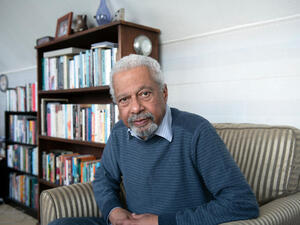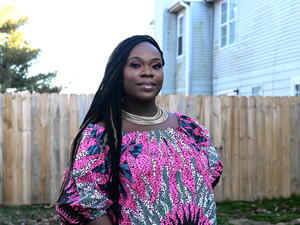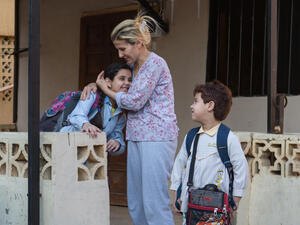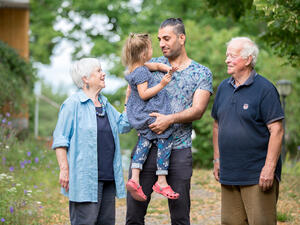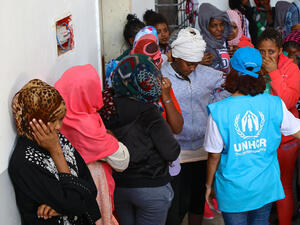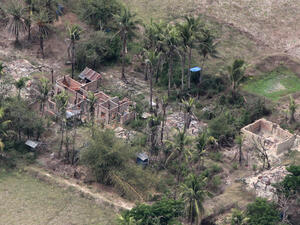UNHCR chief appeals for international aid for desperate Darfurians
UNHCR chief appeals for international aid for desperate Darfurians
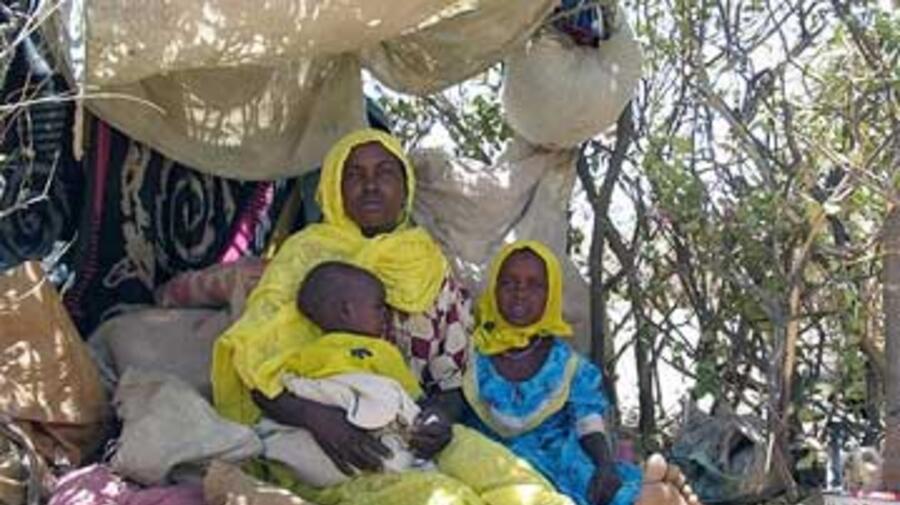
Displaced women in Goz Diga, West Darfur, in a shelter they made out of twigs. They were refugees in Chad who have now have come back to Sudan, but are terrified to go home.
EL GENEINA, Sudan, April 20 (UNHCR) - After visiting desperate women living under trees and families huddled in miserable tiny twig shelters, Acting High Commissioner for Refugees Wendy Chamberlin Wednesday called on the international community to contribute more money for humanitarian relief in Sudan's Darfur region.
"These people desperately, desperately need the kind of assistance we provide," she said in West Darfur on the third day of a five-day visit to the region. "UN agencies simply do not have the funding to provide them the assistance they desperately need to survive."
Chamberlin visited a group of women - mostly widows with small children - who had been found living in a wadi (dry riverbed) under trees by UNHCR staff. They, like the people living in flimsy shelters of twigs and grass in Goz Diga village in the Kulbus area of West Darfur, had been refugees in Chad and have now come home. UNHCR mobile teams are fanning out into the countryside and the desert looking for displaced people and refugees who have returned to the country but are scared to go to their destroyed villages.
"We visited two villages, one Arab and one attacked by Arabs, but in both villages families had started to come back," she said at the end of a gruelling day in the sweltering heat of Darfur, a war-torn area the size of France. Two years of conflict in Darfur have uprooted 2 million people (1.8 million in Darfur and 200,000 in neighbouring Chad) fleeing militia attacks on their villages.
"They came back from Chad for a variety of reasons - because conditions were worse along the border there, because the Sudanese government told them to come back to receive UN aid, because they wanted to be close to their land," the Acting High Commissioner said. "Whatever the reason, they are desperate and they have no aid and we, as the UN refugee agency, have a duty to assist returned refugees."
Zaina Abakar, a 35-year-old widow with three children, told members of Chamberlin's team that she and others living in the wadi have to eat seeds they find on the ground, seeds that are so tough they have to be boiled for three days.
Zaina said she, the other women and their children live in fear, and, ironically, were frightened even by the arrival of Chamberlin's helicopter.
"We are living here, yes, but we are scared," Zaina said, cuddling her year-old baby boy Mohammed. "We are scared of everything. When we saw your plane (helicopter), we thought of running away. Whenever anything happens we think of running."
Still, she said, she and the other women wanted to come back to Darfur from their four-month exile in Chad. "This is our place, our country. Even our donkey, when it gets lost, it comes here. Even when our goats walk, they come here." She begged the UN to bring food, water, and above all, security.
Chamberlin, who said she was haunted by the tales she heard, said "we have visible proof that it's dangerous for people."
She called on donors not to forget Darfur in their rush to aid victims of Asia's December 26 tsunami, and cautioned against hopes of any quick end to the Darfur crisis, already more than two years old.
The UN refugee agency and other aid organisations "are here for the long term. People we have seen are terrified to go back to their villages. There was still a great deal of fear in their faces because of the things they have been through. Clearly they want and need more protection from the African Union troops, from the UN and particularly the protection the UN refugee agency is best capable of providing."
She praised the work of UNHCR staff in the field. "I found them sweaty, dusty and harried," she said. "They are haunted because they realize they are the only thing standing between survival and death for hundreds of thousands of people. They have my profound respect."
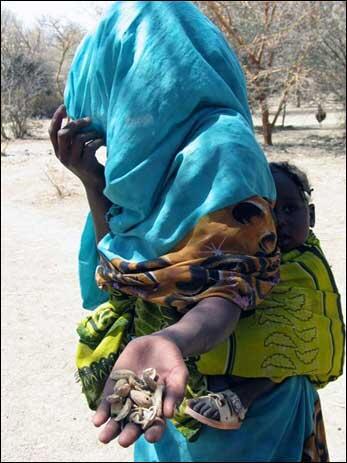
This woman wouldn't show her face but wanted to show the seeds she boils for three days to make them soft to eat.
Meanwhile, back at the wadi, Zaina said she dreams of living once again in her home village, which she says was bombed and destroyed by government forces last year, but not just yet.
"When there is nothing that is going to kill us, we will go back," she said simply.
By Kitty McKinsey in El Geneina, Sudan

